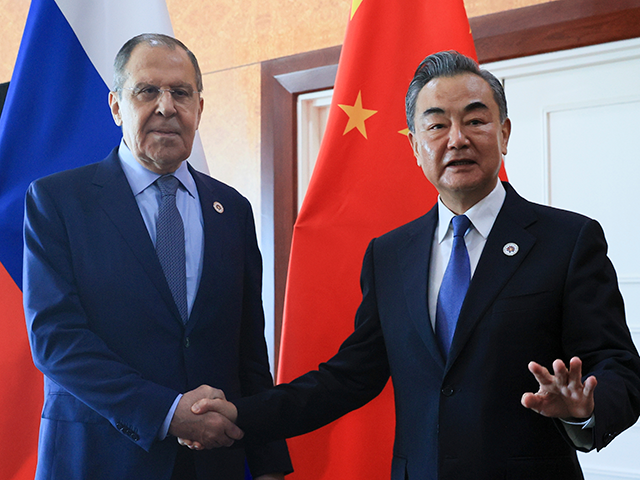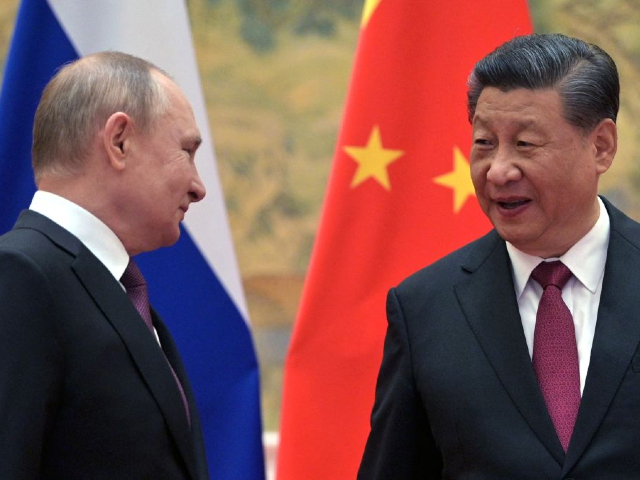Chinese Foreign Minister Wang Yi announced on Monday that Russian leader Vladimir Putin will attend the third Belt and Road Forum for International Cooperation in Beijing on Tuesday.
The trip, made at the invitation of Chinese dictator Xi Jinping, will be Putin’s first journey beyond the old Soviet borders since he was indicted for war crimes by the International Criminal Court in March.
“We are confident that President Putin’s participation will add a lot to the forum’s success and will also contribute to promoting our strategic interaction,” Wang said.
Putin said he intends to discuss all aspects of China’s “unlimited partnership” with Russia, all the way down to the two nations sharing martial arts competitions. Putin, 71, is an avid practitioner of judo, but Russia has its own grappling art called sambo, which began as a militarized adaptation of Japanese judo and jiu-jitsu.
“Wushu is very popular in Russia,” Putin said in an interview with Chinese media, using a blanket term for Chinese martial arts. “I hope it will grow even more so; and we would also like to show our Chinese friends our national martial arts, as we call them, such as sambo wrestling.”
“I will certainly discuss this issue with your President during my visit, suggest we cooperate on a mutual basis, and ask him to support initiatives of young people, athletes, in order to expand collaboration in sports,” he said.

In this photo released by the Russian Foreign Ministry Press Service, Russian Foreign Minister Sergey Lavrov and Chinese Foreign Minister Wang Yi pose for a photo prior to their talks on the sideline of the 12th East Asia Summit foreign ministers’ meeting in Phnom Penh, Cambodia, on Aug. 5, 2022. (Russian Foreign Ministry Press Service via AP, File)
Russian Foreign Minister Sergey Lavrov said relations between his country and China are “on the rise,” and “every related aspect” would be discussed by Putin and Xi during two days of meetings on Tuesday and Wednesday.
“We view this movement and project as part of efforts to promote cooperation based on equality and mutual benefit on the entire Eurasian continent. This includes ties between the Belt and Road project, the Eurasian Economic Union, the Shanghai Cooperation Organization, ASEAN and other organizations active in this geopolitical and economic space,” Lavrov said.
“We are interested in the Third Belt and Road International Forum becoming successful. The very fact that almost 150 delegations representing various countries and organizations will take part in the event highlights the importance of this project and its very good prospects,” he said.
One of those delegations will be from the Taliban, a regime that has been snubbed by most of the world since its violent conquest of Afghanistan in 2021. Taliban commerce minister Haji Nooruddin Azizi is on the guest list for the Belt and Road forum. China has not officially recognized the legitimacy of the Taliban government but has been eager to do business with it, especially to procure minerals needed by Chinese industry.
Western governments, including the United States, have criticized the Belt and Road Initiative (BRI) as a form of “debt colonialism” because China lures impoverished countries into taking out loans they can never repay for massive infrastructure projects of dubious value, then uses its immense debt leverage to extract concessions from client states. BRI projects are also notorious for being environmentally destructive and ruthlessly exploitative of local labor.
Putin on Monday insisted BRI is free of deception and coercion, unlike the development plans of “colonialist countries.”
“The best part of co-operations proposed by China is that within the cooperation framework, no one imposes anything on others. It is all about looking for solutions, projects and approaches that are acceptable to all parties to achieve a common goal. There is no imposition on each other nor coercion, but opportunities,” Putin told Chinese state media.
“Some people view the Belt and Road Initiative as an attempt by China to conquer others, but that is not what we’ve seen – we see the desire for cooperation,” Putin insisted.
Putin has awkwardly avoided some other international gatherings, such as the recent BRICS summit in South Africa because the International Criminal Court (ICC) issued a warrant for his arrest in connection with the mass abduction of Ukrainian children.
Putin has no fear of being arrested in China, which is not a member state of the ICC and disdains the entire Western concept of human rights. Isolated from the Western world after his invasion of Ukraine, Putin needs China’s diplomatic and economic support, and he seems willing to let BRI expand into traditional regions of Russian influence to get it.
Chinese President Xi Jinping proposes a toast during the welcome banquet for leaders attending the Belt and Road Forum at the Great Hall of the People on April 26, 2019, in Beijing, China. (Nicolas Asfouri – Pool/Getty Images)
“Russia is a safe neighbor that is friendly, that is a source of cheap raw materials, that’s a support for Chinese initiatives on the global stage and that’s also a source of military technologies, some of those that China doesn’t have,” Carnegie Russia Eurasia Center director Alexander Gabuev told the Associated Press (AP) on Monday.
“For Russia, China is its lifeline, economic lifeline in its brutal repression against Ukraine,” Gabuev continued. “It’s the major market for Russian commodities, it’s a country that provides its currency and payment system to settle Russia’s trade with the outside world – with China itself, but also with many other countries, and is also the major source of sophisticated technological imports, including dual-use goods that go into the Russian military machine.”
Gabuev suggested the blossoming partnership between Putin’s Russia and Xi’s China would come up short of a full military alliance, but they would cooperate closely on a range of mutually desirable military projects, especially a missile shield competitive with Western technology.
Radio Free Europe (RFE) predicted one of Putin’s top agenda items at the Beijing conference would be securing a commitment from China to build the “Power of Siberia-2” gas pipeline, which would bring gas from Russia’s extensive reserves in the Yamal Peninsula to energy-hungry China.
“Russian officials have in recent months met with their counterparts from China and Mongolia – where the pipeline is intended to traverse – with Russian Deputy Prime Minister Aleksandr Novak announcing in September that Power of Siberia-2’s route is to be finalized after the trilateral negotiations,” RFE noted.
Putin’s entourage in Beijing will reportedly include the top officials of Russia’s two major energy corporations, Gazprom and Rosneft, another clue that the Power of Siberia-2 project will be discussed.
Some analysts believe China’s interest in the project has waned as its economy softened and it looked elsewhere for its energy needs, but Xi might still sign off on the pipeline as a favor to Putin, both to boost Russia’s economy and confer some much-needed diplomatic prestige. Then again, the pipeline project’s economics are evidently so unfavorable to China that Xi might embarrass Putin by sending him home with nothing but promises to keep thinking about it.
“The Russia-China relationship is strong and both Xi and Putin appear intent to lay the foundations so it can outlast them as leaders,” Atlantic Council Global Energy Center senior fellow Joseph Webster told RFE, alluding to the advancing age of both authoritarian rulers and their quest for an enduring legacy.
